Looking for a mixed vegetable gravy recipe that’s not your regular one? Here’s a South Indian special for you – the Kara Kuzhambu (also called Kara Kulambu) is a simple, earthy, and tasty gravy that is flavored with a roasted coconut-spice paste. This spiced and tangy Kuzhambu is a delicacy from the cuisine of Tamil Nadu in South India. Since this recipe is completely made with plant-based ingredients, it is really nutritious.
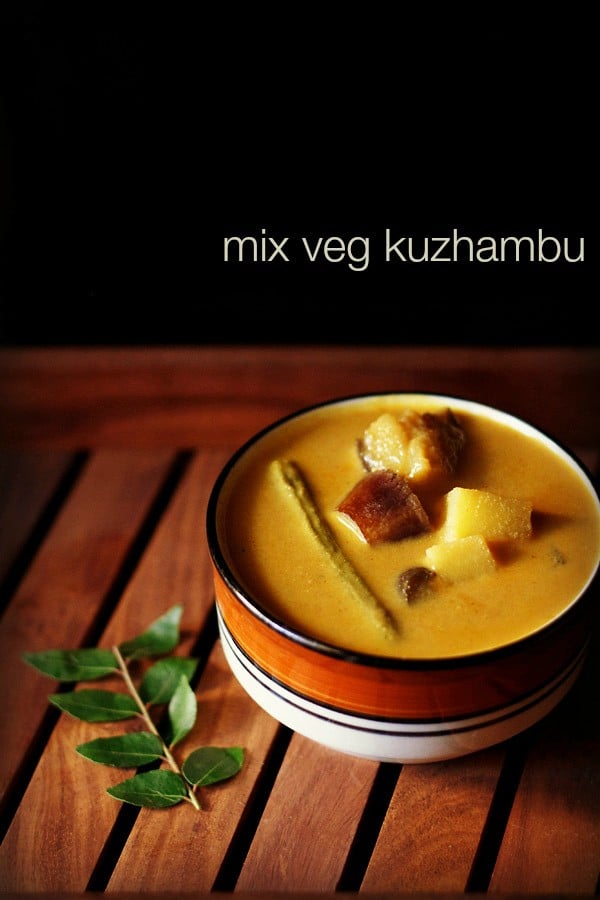
About Kara Kuzhambu
In addition to the flavors, the mixed vegetables, pearl onions and urad dal (split black gram) bring in a great texture in this Kara Kuzhambu. These also turn the dish into a wholesome and delicious South Indians tyle mixed vegetable preparation. Along with these ingredients, the dominant flavors from the roasted coconut-spice paste elevate the flavors in this gravy.
Kuzhambu or Kulambu is a typical South Indian curry based dish from the cuisine of Tamil Nadu. There are a number of varieties and variations in preparing kuzhambus.
In addition to this Kara Kuzhambu, I also have the Mor Kulambu, Vatha Kulambu, Poricha Kulambu and Ennai Kathirikai Kulambu recipes on my blog.
A unique kulambu preparation is the vathal kuzhambu that is made with unripe green berries of the rare black nightshade plant. Just like this Kara Kuzhambu, any other kuzhambu gravy may or may not have lentils added to them.
The fact that you can have an array of veggies in this Kara Kulambu recipe in the most tasty as well as healthy way, is what makes this dish a complete favorite with my folks at home too.
So, just like the other North Indian mixed veggie preparations, I also often make this Tamil style veg curry at home.
The best way to relish this Kara Kuzhambu or any other authentic kulambu is to pair it with steamed rice or even idli or dosa. You can add a side of some fried or roasted pappadums and turn it into a deliciously warming and comforting meal.
For this recipe of Kara Kuzhambu, I have used vegetables like drumsticks, pearl onions, brinjals, carrots and potatoes. You can add more of your favorite veggies in this simple kulambu gravy and make it heartier and filling.
Some of the other vegetables that you can add in this recipe are a mix of okra, radish, beans, bottle gourd, cauliflower, pumpkin, plantains or yam.
This vegan recipe of Kara Kulambu also has a rustic paste made with coconut and some whole spices. This imparts the typical South Indian essence in the dish. The gravy also has sour notes from the addition of tamarind in it.
As I mentioned before, whenever I have mixed vegetables at home, Kara Kuzhambu is one dish that happens to be there on the menu by default. You can cook this gravy in sesame oil, coconut oil or any other neutral flavored oil.
How to make Kara Kuzhambu
Preparation
1. Heat a small pan on low flame and add the following spices:
- 3 teaspoons coriander seeds
- ¼ teaspoon fenugreek seeds
- ¼ teaspoon black peppercorns
- ½ teaspoon cumin seeds
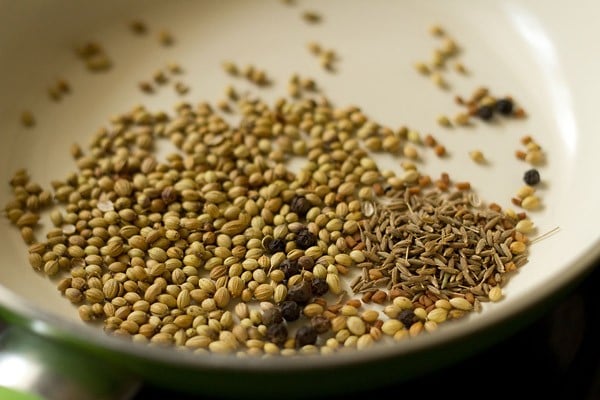
2. Stirring often, dry the roast spices till fragrant. Keep aside and allow the roasted spices to cool. No need to brown the spices. Just lightly roast till fragrant.
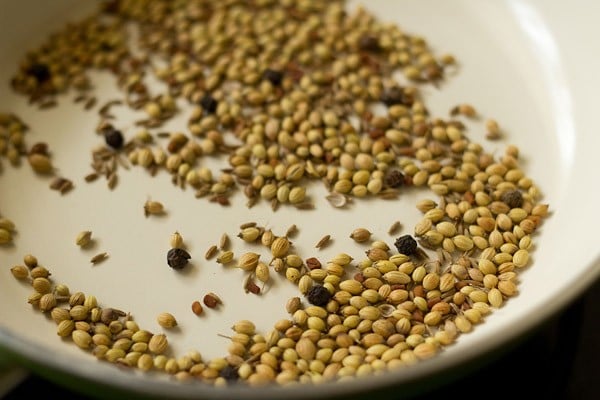
3. In a small bowl, soak ½ tablespoon tightly packed seedless tamarind in ½ cup hot water for 20 to 30 minutes.
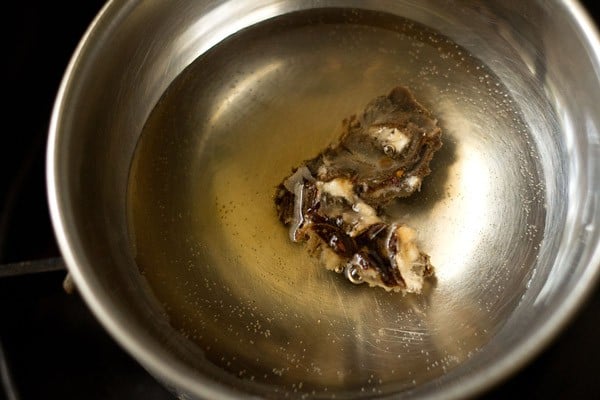
4. Add the roasted spices in a grinder jar along with ½ cup chopped or grated coconut.
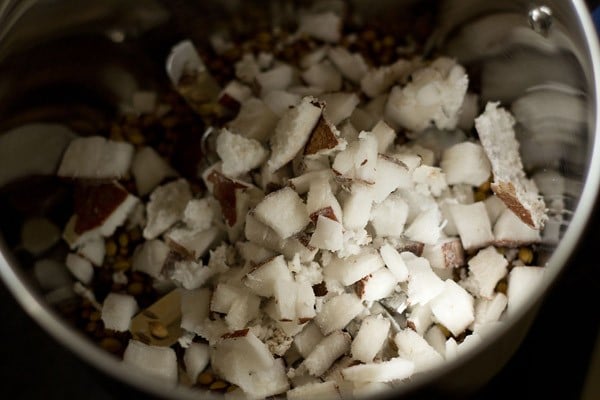
5. Add ½ to ⅔ cup water and grind to a fine and smooth paste. Keep aside.
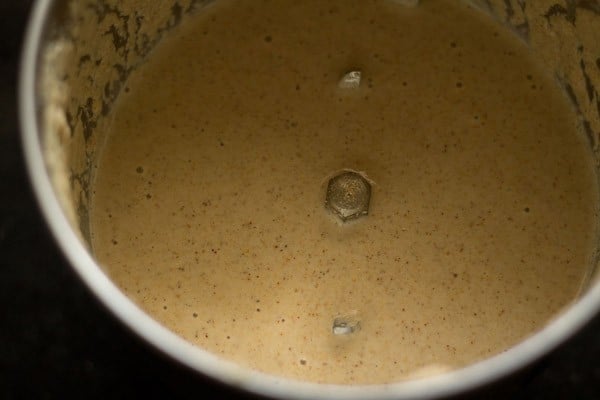
6. Quarter brinjals and soak in salted water for 15 to 20 minutes. Also, chop the other vegetables.
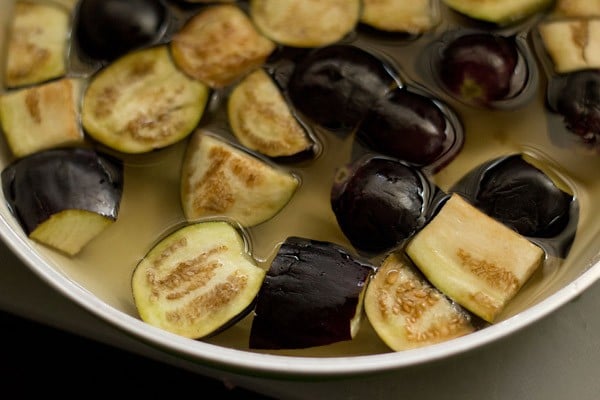
Cook Vegetables
7. Heat 2 tablespoons oil in a pan. Lower the heat, add ½ teaspoon mustard seeds and 1 teaspoon urad dal.
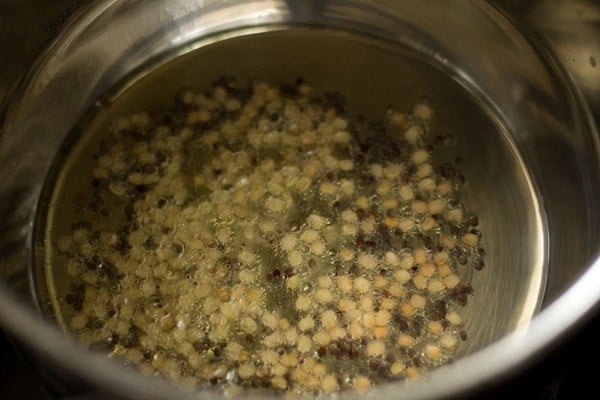
8. On low heat, crackle the mustard seeds and brown the urad dal.
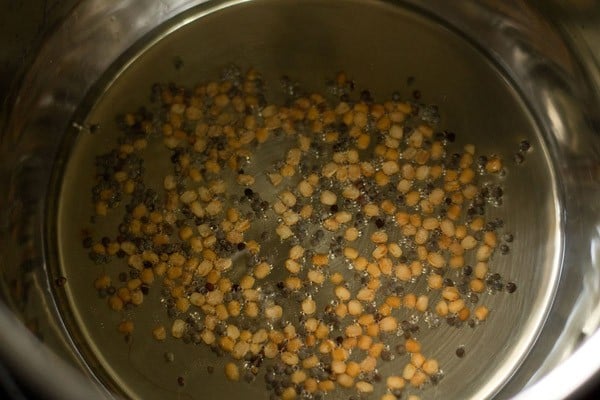
9. Add 9 to 10 pearl onions or shallots and 8 to 10 curry leaves. Stir and sauté for 2 minutes or till the onions soften and get slightly golden from the edges.
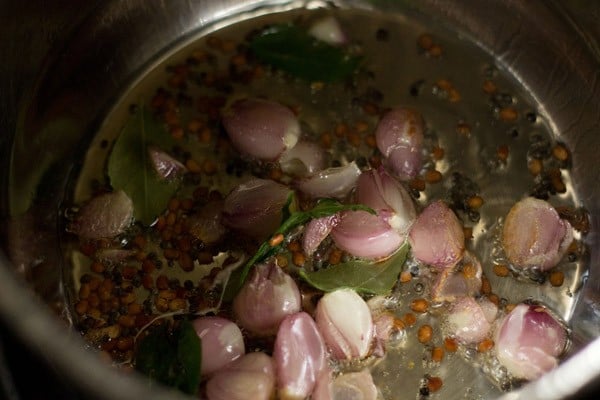
10. Then, add 1 chopped medium tomato. Stir and sauté for a minute or two.
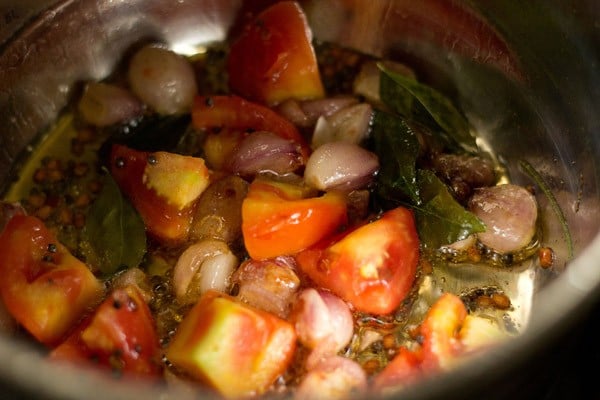
11. Next, add 1.5 cups of mixed chopped vegetables. I used drumsticks, brinjals, carrot, and potato.
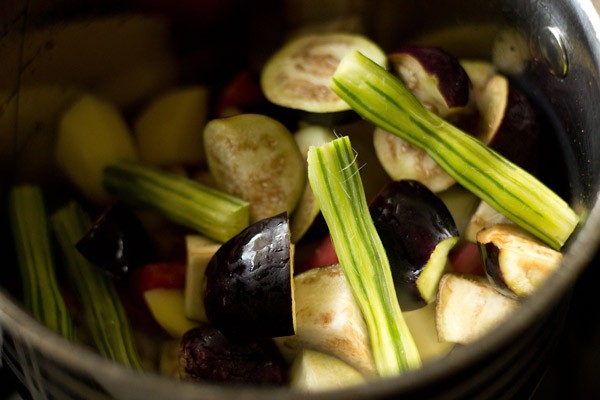
12. Add ¼ teaspoon turmeric powder and ½ teaspoon red chili powder.
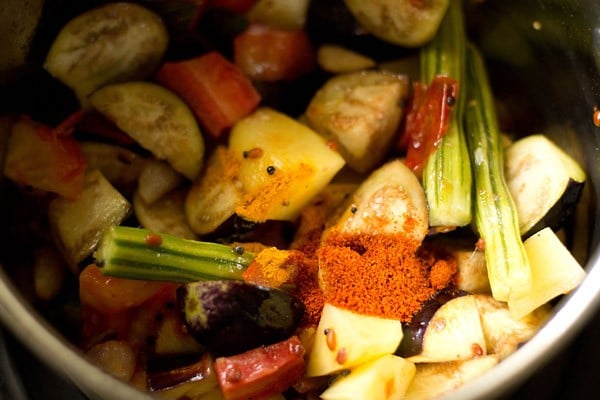
13. Stir well and sauté the vegetables for a minute or two.
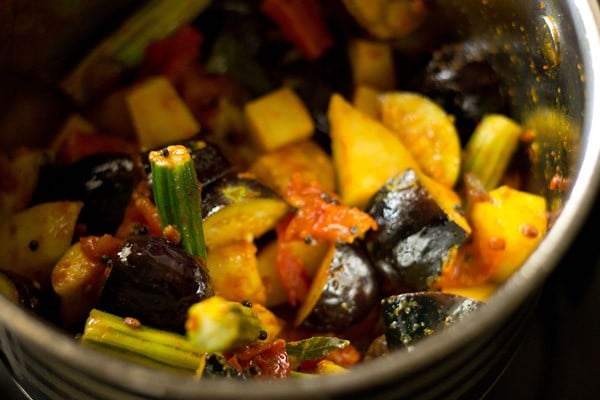
14. Add 1.5 cups water.
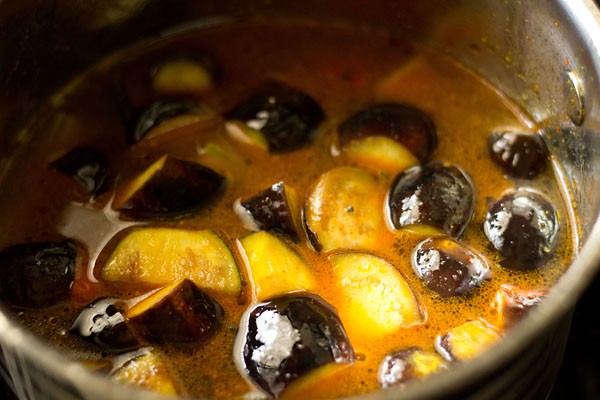
15. Add salt as required.
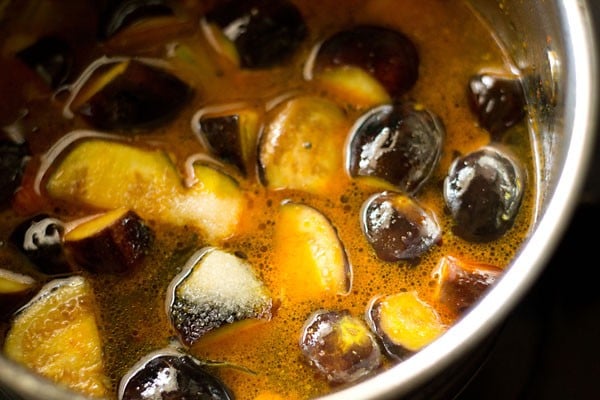
16. Stir and cover the pan. On low to medium heat, simmer till the vegetables are almost cooked.
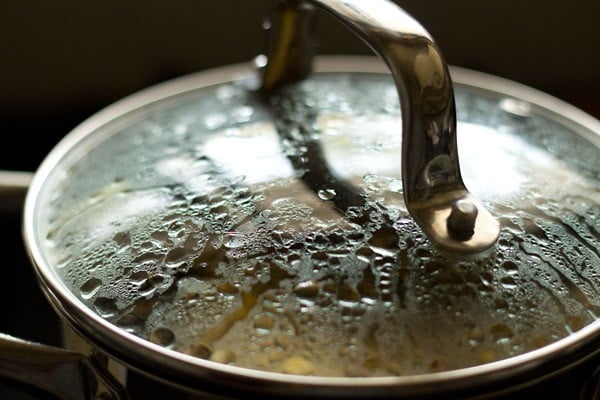
Make Kara Kulambu
17. Squeeze the extract from the soaked tamarind.
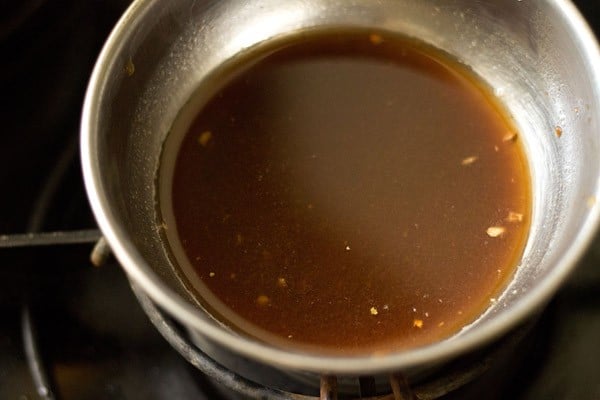
18. Once the vegetables are cooked, add the tamarind extract.
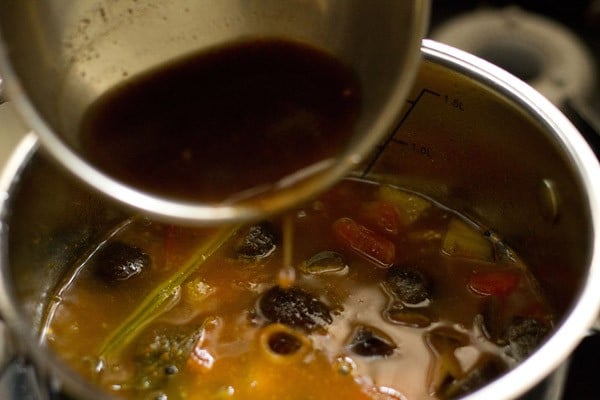
19. Add the prepared ground coconut and spices paste. If the gravy looks thick, then you can add some water.
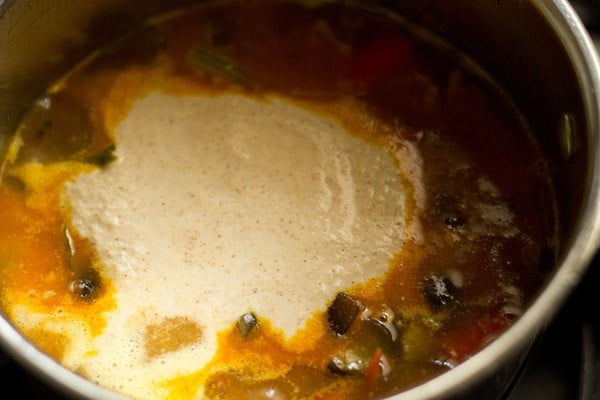
21. Stir very well.
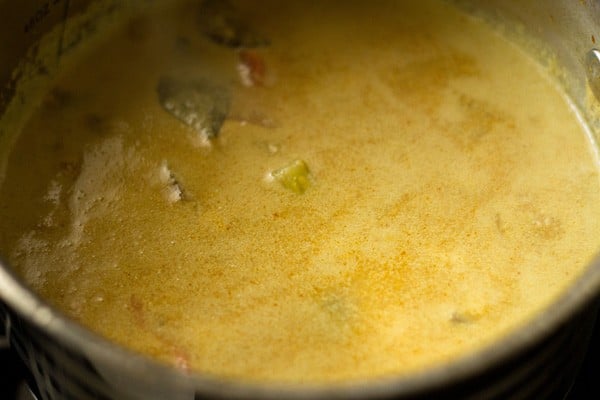
21. Simmer Kara Kuzhambu on low heat for 7 to 8 minutes, without the lid.
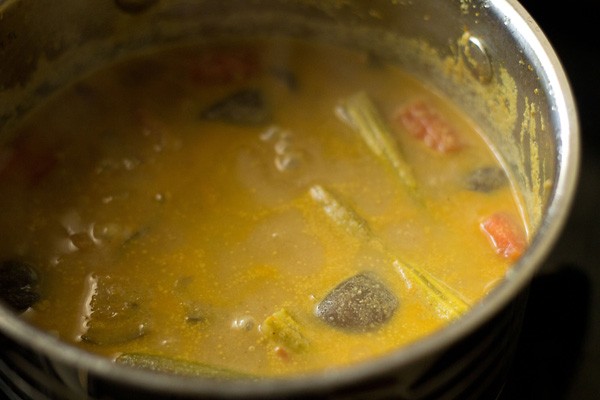
22. Serve Kara Kulambu with steamed rice, idli or dosa.
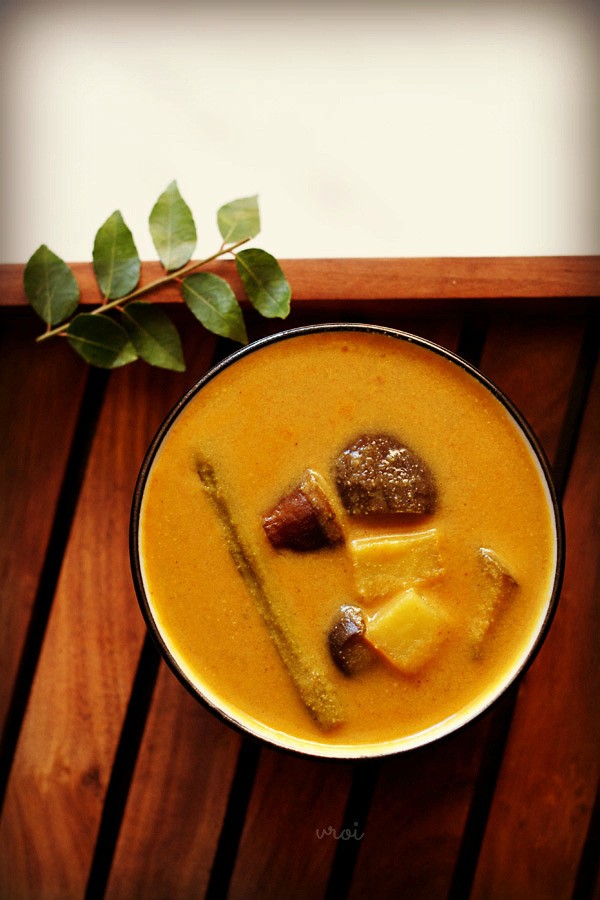
Expert Tips
- Apart from the vegetables I have used in this recipe of Kara Kuzhambu, you can also add any other vegetable of your choice. Cauliflower, okra, plantain, yam, radish, french beans, bottle gourd and pumpkin work well in this curry.
- For okra, sauté them in some oil until they are almost cooked and then add them later when you add the coconut and spices paste to make the gravy.
- Generally in restaurants, they use drumsticks, brinjals and pearl onions (small onions that is added in Sambar). But you could use vegetables that you have. You can also use regular onions.
- The best and most authentic flavor in the dish comes by using sesame oil (gingelly oil). But feel free to use any neutral flavored oil that you have. You can also use coconut oil.
- You have to grind the paste to a fine and smooth one. Do not keep it coarse or semi-fine. Feel free to swap fresh coconut with frozen coconut.
- The quantity of water in the gravy can also be adjusted. If it is too thick, add some more water to get the desired consistency.
More South Indian Vegetable Preparations!
South Indian Food Recipes
Kerala Recipes
Indian Curry Recipes
Indian Curry Recipes
Please be sure to rate the recipe in the recipe card or leave a comment below if you have made it. For more vegetarian inspirations, Sign Up for my emails or follow me on Instagram, Youtube, Facebook, Pinterest or Twitter.
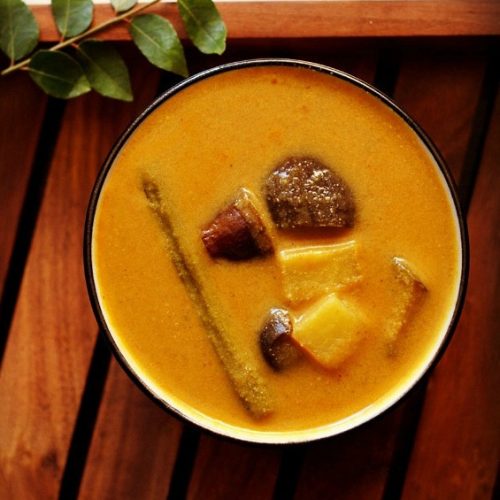
Kara Kuzhambu | Kara Kulambu
Ingredients
For kara kuzhambu gravy
- 2 tablespoons oil – sesame oil or preferred neutral oil
- ½ teaspoon mustard seeds
- 1 teaspoon urad dal (hulled and split black gram)
- 9 to 10 pearl onions or 4 to 5 shallots or 1 medium to large onion – diced
- 8 to 10 curry leaves or 1 sprig of curry leaves
- 1 tomato – medium-sized, chopped
- 1.5 cups vegetables – chopped; brinjals, potatoes, carrots or your preferred veggies
- 1 or 2 drumsticks peeled and chopped in 2 to 3 inches batons
- ¼ teaspoon turmeric powder
- ½ teaspoon red chilli powder
- 1.5 cups water – to add to kuzhambu gravy
- salt as required
For making tamarind extract
- ½ tablespoon tamarind – tightly packed
- ½ cup water – hot, for soaking tamarind
For roasting and grinding to paste
- 3 teaspoons coriander seeds
- ¼ teaspoon fenugreek seeds
- ¼ teaspoon whole black pepper
- ½ teaspoon cumin seeds
- ½ cup coconut – chopped or grated, fresh or frozen
- ½ to ⅔ cup water – for grinding or blending
Instructions
Preparation
- Heat a small pan. Keep the heat to a low and add the following spices – coriander seeds, fenugreek seeds, black pepper and cumin seeds.
- Stirring often, dry the roast spices till fragrant. Set aside and allow the roasted spices to cool.
- Meanwhile in a small bowl, soak tamarind hot water for 20 to 30 minutes.
- Add the roasted spices in a grinder jar along with grated coconut or chopped coconut
- Add ½ to ⅔ cup water and grind to a smooth and fine paste. Set aside.
- Quarter the brinjals and keep them in soaked salted water for 15 to 20 minutes. Also chop the other veggies.
Making kara kuzhambu
- Heat 2 tablespoons oil in a pot or pan.
- Lower the heat and add mustard seeds and urad dal.
- On a low heat crackle the mustard seeds and brown the urad dal.
- Add the pearl onions or chopped shallots and curry leaves. Stir and sauté for a minute on low heat.
- Then add chopped tomatoes. Stir and sauté till the tomatoes soften.
- Add the chopped veggies. Add turmeric powder and red chili powder.
- Stir well and saute the veggies for a minute or two.
Making kara kuzhambu
- Add 1.5 cups water. Also add salt as required.
- Stir to mix. Cover the pan with lid. On a low to medium heat simmer the veggies, till they are almost cooked.
- Squeeze the tamarind extract from the soaked tamarind and set aside.
- Once the veggies are almost cooked, add the tamarind extract.
- Add the ground coconut and roasted spices paste. Stir and mix very well.
- If the gravy consistency looks thick, add some water and mix.
- Simmer the kuzhambu gravy for 7 to 8 minutes on a low heat without the lid. Stir at intervals.
- Serve Kara Kuzhambu with steamed rice or even with idli or dosa.
Notes
- While I have used drumsticks, brinjals, carrots, potatoes, you can opt to use any other vegetable of your choice like cauliflower, okra, plantain, yam, radish, french beans, bottle gourd and pumpkin.
- For okra, sauté them in some oil until they are almost cooked and add them later when you add the coconut and spices paste.
- Instead of pearl onions (or sambar onions), use shallots or regular onions.
- The best and most authentic flavor in the dish comes by using sesame oil (gingelly oil). But feel free to use any neutral flavored oil that you have.
- You could use frozen coconut instead of fresh coconut.
- The consistency of the gravy can be medium-thick to medium, so adjust by adding less or more water.
Nutrition Info (Approximate Values)
This Kara Kuzhambu recipe from the archives, first published in February 2015 has been updated and republished on January 2023.
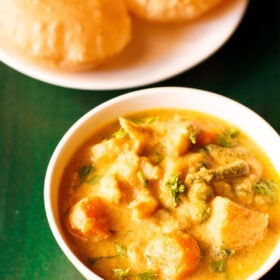
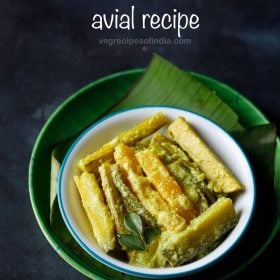
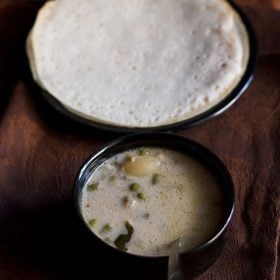
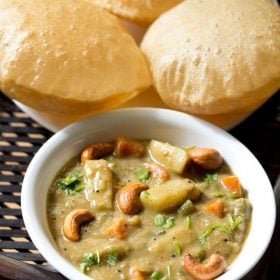
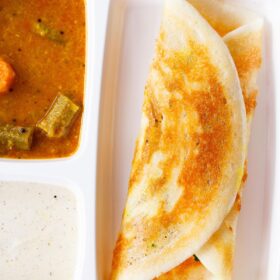
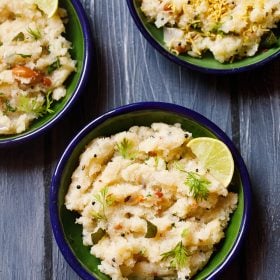
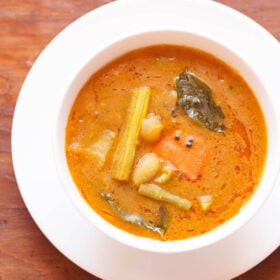
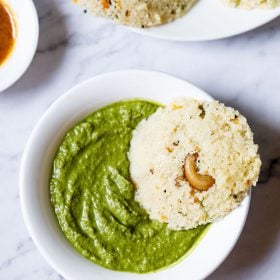








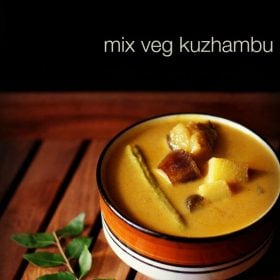
I tried this kulambu a few days back and it was awesome. I should say that it was a different version of kulambu recipes. Some hotels serve this type.
Thanks for the recipe.
thanks much shruthi. glad you liked the kulambu.
In vegitable stew recipe if I want to use ready made coconut milk then how to use it n wt will be the quantity
first cook the veggies with water. then add the thick coconut milk once the veggies are cooked. simmer for half a minute. use the same amount as mentioned in the recipe.
Hi amit,
I love your cooking from south indian to northindian. My first choice is your site I look for recepies in your site if not available I look for other options. I must say this site is in my bookmarks
thanks a lot lavanya.
This recipe looks amazing, but I want to know, what are brinjals and what are the drumsticks? The brinjals look like baby eggplants and the drumsticks look like either okra or chopped up sticks of zucchini. Please help the white person who likes indian food!!
aleisha, brinjal are eggplants. drumsticks are moringa pods.
Excellent!! Great flavours. Thank you, Dassana. We had kuzhambu with dosas.
welcome sari
Thanks for your lovely recipes, Dassana. I liked everything I tried from this site!!! I would have given more often positief feedback or a good rating, but most of the times the discussion was already closed. So, all in one; THANK YOU!
Just one question; are the brinjals part of the 1.5 cups of veggies we are supposed to use? If not, how much brinjals should I use? I see clear instructions for brinjals, but not a separate amount of them.
Take care and keep on posting. Your Indian recipes are great!!!
thank you sari. we had closed the comment on older posts as we are really short of time these days. but for some days again we have opened it. 1.5 cups includes the brinjals. 10 to 12 small brinjals can be added.
Great looking recipe. You’re website is great and really helping me with South Indian recipes. Unfortunately South Indian cooking is relatively rare in Britain!
I’ve not got any fresh coconut. Do you think I could substitute it with some canned coconut milk?
Cheers!
thanks daniel. you could easily add canned coconut milk. add the coconut milk right towards the end and then simmer till the kuzhambu is hot. no need to boil.
Lovely recipe dassana! I love ur website. Its the top on my list of frequent websites.
My husband and I learn ur recipes and we cook together. Thank u :). He loves ur presentation and photos.
welcome karunya. glad to know this. thanks for sharing positive feedback on recipes presentation.
Hi, I like the your recipes. The step by step processes help someone like me who is not good at cooking. Thanks for all the recipes. I was wondering if you can post some chicken recipes. I am hoping you are a non vegetarian.
Welcome SKhan. Good to know that recipes are helping you. We only cook vegetarian food at home. So won’t be able to post chicken recipes.
Hii dassana i m a cllg student i m doing C.S. i am a boy so i was not having much interest in cooking. But after reading ur recipes i got much inspiration nd i started cooking. Nd now my neighbours like my cooking more than of my mom
So thank u
welcome mrinal. thats nice to know. its always good to know cooking. because it helps you to eat tasty food of your choice and not be dependent upon restaurants.
Hi Dassana….I live in NCR with my mummy and papa…I’ve found your Punjabi recipes very much similar to the ones we made at our home….we are mainly non-vegetarian but when we want to eat South indian meal, I go straight to your website. This is my first response to you.you make veg recipes in very easy way….and same I can say for bajiyas for the non veg.thank you for all your recipes.
welcome mrignayni. good to know this. thanks for sharing positive review on recipes.
My husband and I love using your blog and making the dish recipes together. By any chance do you use the method of making monthly meal plans? if so please do share your monthly meal calendar with us. Even though you have such a huge selection, we are always at a loss of what to eat LOL
Thanks PkT for sharing your positive feedback. i don’t have monthly meal plans. i just plan for next day as per my spontaneity and ingredients available in the kitchen.
Hi, I was wondering If I could use 1/4 cup shredded coconut instead of half cup? I would like to make the curry low fat and If you would recommend adding anything else. Also, I am a vegan. Thx Aneesha
welcome aneesha. yes you can add but the taste will change. because coconut gives lot of flavor in the dish. then reduce on the tamarind and water also.